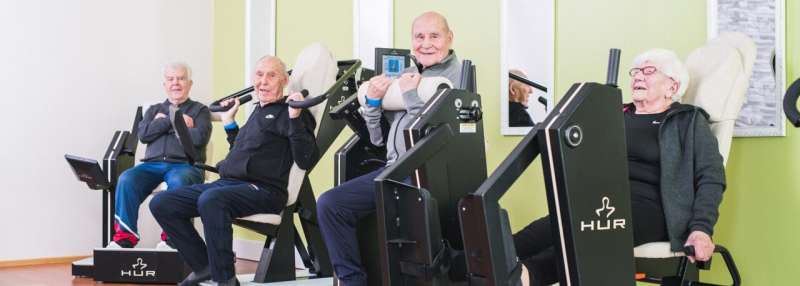Credit: University of Stirling
Resistance training in frail older adults is effective in delivering significant improvements in functional capacity and strength, according to a new study by the University of Stirling.
A randomized control feasibility trial conducted at a UK residential care home found that a six-week machine-based resistance training program benefitted participants, compared to a control group.
The study—led by Professor Anna Whittaker, Bridgitte Swales and Dr. Gemma Ryde, all of the University's Faculty of Health Sciences and Sport—is published in the Journal of Aging and Physical Activity. The team believe that their findings indicate that resistance training could help to tackle the negative health outcomes associated with frailty, including disability and mortality.
Professor Whittaker said: "We know that physical activity is an effective intervention to improve functional health status, however, prior to our study, the effect of resistance training on multidimensional health in frail older adults was unclear.
"Our study focused on care home residents for a six-month period. We observed major improvements in frailty and physical function—such as walking speed, functional capacity and physical confidence—in the group of frail older adults who participated in resistance training.
"For the first time, our research underlines the importance of exercise—particularly resistance training—in later life and its role in helping to reduce and reverse frailty. This is especially important when you consider the adverse health outcomes—such as disability and mortality—associated with frailty."
The research team worked with 11 frail residents, aged 65 or over, at Olivet Christadelphian Care Home in Birmingham. The group completed a six-week program, which required them to participate in resistance training on specialized exercise machines, provided by HUR Ltd, for 30–40 minutes three times per week. The smart-activated technology starts users at near zero resistance, increasing in small increments in line with their progress, unlike standard exercise machines.
Notably, this is the first study of its kind in the UK to use this equipment with older adults.
Baseline measurements were taken of all participants and a control group was also studied. The researchers found those participating in the resistance training experienced a large improvement in frailty—moving from frail to pre-frail status; a clinically important increase of 0.24 meters per second in walking speed; a clinically important increase of 1.50 in their Short Physical Performance Battery score—which measures lower extremity function in older people; and a meaningful impact on self-reported functional capacity and physical confidence.
More information: Bridgitte Swales et al, A Randomized Controlled Feasibility Trial Evaluating a Resistance Training Intervention With Frail Older Adults in Residential Care: The Keeping Active in Residential Elderly Trial, Journal of Aging and Physical Activity (2021). DOI: 10.1123/japa.2021-0130
Provided by University of Stirling
























